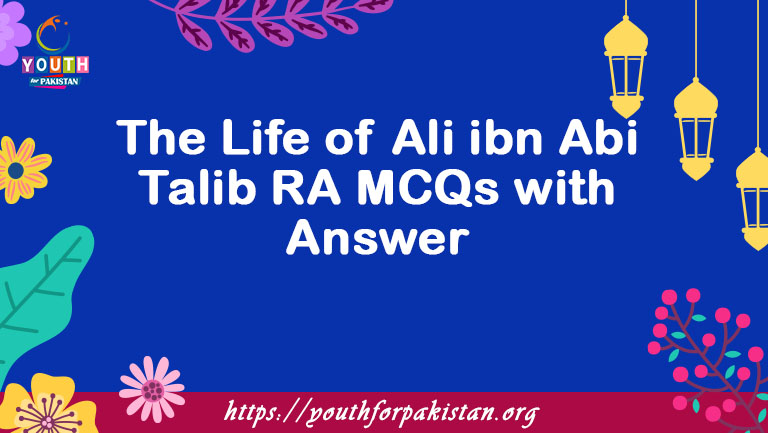The following are The Life of Umar ibn Abdul Aziz RA MCQs with answers related to Islamic Studies. We have arranged the most important and repeated MCQs in all the competitive examinations. The students can clear their concepts for The Life of Umar ibn Abdul Aziz RA MCQs online quiz by attempting these.
The Life of Umar ibn Abdul Aziz RA Online MCQs with Answers
What is the full name of Umar ibn Abdul Aziz, the Umayyad caliph known for his just rule?
a) Umar ibn Uthman
b) Umar ibn Abdul Aziz
c) Umar ibn Al-Walid
d) Umar ibn Abdullah
Umar ibn Abdul Aziz is often referred to as __________ due to his reputation for just governance.
a) Umar the Great
b) Umar the Conqueror
c) Umar the Righteous
d) Umar the Victorious
During which Islamic dynasty did Umar ibn Abdul Aziz serve as the caliph?
a) Abbasid Caliphate
b) Umayyad Caliphate
c) Fatimid Caliphate
d) Rashidun Caliphate
Umar ibn Abdul Aziz is known for his efforts to restore the principles of justice and __________ during his rule.
a) Equality
b) Conquest
c) Patronage
d) Monarchy
What was Umar ibn Abdul Aziz’s relationship to the Umayyad Caliphate?
a) He was the founder of the Umayyad dynasty.
b) He was the last Umayyad caliph.
c) He was a distant relative who became caliph through popular support.
d) He was a close advisor to the Umayyad caliphs.
Umar ibn Abdul Aziz’s reign as caliph is often described as a period of __________.
a) Expansion and conquest
b) Religious persecution
c) Economic prosperity and reform
d) Military conflict and instability
What Islamic title is commonly used to refer to Umar ibn Abdul Aziz due to his role as a religious leader?
a) Imam
b) Sheikh
c) Sultan
d) Caliph
Umar ibn Abdul Aziz’s rule is known for promoting the principles of __________ and justice in governance.
a) Autocracy
b) Tyranny
c) Monarchy
d) Equity
What significant event marked the beginning of Umar ibn Abdul Aziz’s rule as the caliph?
a) The Battle of Tours
b) The Siege of Constantinople
c) The Abbasid Revolution
d) His appointment by the people
Umar ibn Abdul Aziz’s caliphate is often regarded as a period of revival of __________ values in Islamic governance.
a) Secular
b) Military
c) Religious
d) Feudal
Umar ibn Abdul Aziz’s family was known for their contributions to Islamic scholarship and learning. (True/False)
Umar ibn Abdul Aziz’s caliphate is considered a pivotal moment in Islamic history, as it marked a return to the principles of justice and __________.
a) Autocracy
b) Monarchy
c) Equality
d) Expansion
What aspect of Umar ibn Abdul Aziz’s rule is often celebrated by Muslims as a model of just governance?
a) His military conquests
b) His architectural achievements
c) His economic reforms and equitable taxation
d) His expansion of the empire
Umar ibn Abdul Aziz’s caliphate is seen as a period of increased religious tolerance and interfaith dialogue. (True/False)
Umar ibn Abdul Aziz’s commitment to justice and welfare led to reforms in areas such as __________ during his rule.
a) Education
b) Agriculture
c) Taxation
d) Military
What is the Islamic title given to the leader of the community and the religious head, which Umar ibn Abdul Aziz held during his caliphate?
a) Emir
b) Sheikh
c) Imam
d) Sultan
Umar ibn Abdul Aziz is often remembered for his efforts to eliminate corruption and uphold __________ in government.
a) Nepotism
b) Tribalism
c) Justice
d) Monarchy
What was the source of Umar ibn Abdul Aziz’s authority and legitimacy as caliph?
a) Divine appointment
b) Hereditary succession
c) Popular acclaim
d) Military conquest
Umar ibn Abdul Aziz’s rule is often cited as a model for Islamic governance based on justice, equity, and adherence to __________.
a) Cultural traditions
b) Religious texts
c) Feudal hierarchies
d) Monarchic rule
What is the term used to describe the Islamic practice of charitable giving and almsgiving, which was encouraged and facilitated during Umar ibn Abdul Aziz’s rule?
a) Jihad
b) Zakat
c) Hajj
d) Fasting
Umar ibn Abdul Aziz’s caliphate is often seen as a period of revival of Islamic __________ in governance and society.
a) Art and culture
b) Science and technology
c) Law and jurisprudence
d) Poetry and literature
What is the Arabic term for the system of Islamic law and jurisprudence, which Umar ibn Abdul Aziz sought to uphold during his rule?
a) Sunnah
b) Sharia
c) Hadith
d) Fiqh
Umar ibn Abdul Aziz’s reforms included ensuring that government officials were held accountable for their actions, promoting transparency, and preventing __________.
a) Taxation
b) Inflation
c) Corruption
d) Military coups
During his caliphate, Umar ibn Abdul Aziz is credited with instituting reforms that improved the lives of __________ in the Islamic empire.
a) The nobility
b) Non-Muslims
c) The military
d) Foreign traders
What is the term for the religious scholars and jurists who played a key role in interpreting Islamic law during Umar ibn Abdul Aziz’s rule?
a) Sufis
b) Imams
c) Ulama
d) Mullahs
Umar ibn Abdul Aziz’s caliphate is often remembered for promoting social justice and equitable __________.
a) Distribution of wealth
b) Taxation
c) Military conquests
d) Expansion
What is the term for the religious scholars who specialize in interpreting Islamic law and jurisprudence, and who played a significant role during Umar ibn Abdul Aziz’s rule?
a) Mujahideen
b) Sufis
c) Ulama
d) Caliphs
Umar ibn Abdul Aziz’s efforts to promote justice and equitable governance are often seen as a reflection of Islamic __________.
a) Tolerance
b) Jihad
c) Principles
d) Expansion
What is the term for the religious scholars and authorities who specialize in interpreting Islamic law and providing legal opinions?
a) Imams
b) Ulama
c) Sufis
d) Mujahideen
Umar ibn Abdul Aziz’s rule is often seen as a revival of the principles of __________ in Islamic governance.
a) Autocracy
b) Monarchy
c) Justice and equity
d) Military conquest
What is the term for the obligatory pilgrimage to the holy city of Mecca, which Umar ibn Abdul Aziz encouraged and facilitated for Muslims?
a) Jihad
b) Zakat
c) Hajj
d) Fasting
Umar ibn Abdul Aziz’s efforts to uphold justice and promote the welfare of his subjects extended to both Muslims and __________ in the Islamic empire.
a) The military
b) Non-Muslims
c) The nobility
d) Foreign traders
What Islamic concept emphasizes the importance of striving for the greater good and promoting justice in society, which Umar ibn Abdul Aziz embodied in his rule?
a) Ijma
b) Ijtihad
c) Amr bil Maroof
d) Maslaha
Umar ibn Abdul Aziz’s caliphate is often cited as an example of Islamic governance that prioritized the welfare of the __________.
a) Elite
b) Military
c) Common people
d) Foreign allies
What is the Arabic term for the consensus of Islamic scholars on matters of religious interpretation and jurisprudence, which played a role in Umar ibn Abdul Aziz’s governance?
a) Ijma
b) Ijtihad
c) Amr bil Maroof
d) Maslaha
Umar ibn Abdul Aziz’s reforms included ensuring that government officials were held accountable for their actions, promoting transparency, and preventing __________.
a) Taxation
b) Inflation
c) Corruption
d) Military coups
What is the term for the religious scholars and authorities who specialize in interpreting Islamic law and providing legal opinions?
a) Imams
b) Ulama
c) Sufis
d) Mujahideen
Umar ibn Abdul Aziz’s rule is often seen as a revival of the principles of __________ in Islamic governance.
a) Autocracy
b) Monarchy
c) Justice and equity
d) Military conquest
What is the term for the obligatory pilgrimage to the holy city of Mecca, which Umar ibn Abdul Aziz encouraged and facilitated for Muslims?
a) Jihad
b) Zakat
c) Hajj
d) Fasting
Umar ibn Abdul Aziz’s efforts to uphold justice and promote the welfare of his subjects extended to both Muslims and __________ in the Islamic empire.
a) The military
b) Non-Muslims
c) The nobility
d) Foreign traders
What Islamic concept emphasizes the importance of striving for the greater good and promoting justice in society, which Umar ibn Abdul Aziz embodied in his rule?
a) Ijma
b) Ijtihad
c) Amr bil Maroof
d) Maslaha
Umar ibn Abdul Aziz’s caliphate is often cited as an example of Islamic governance that prioritized the welfare of the __________.
a) Elite
b) Military
c) Common people
d) Foreign allies
What is the Arabic term for the consensus of Islamic scholars on matters of religious interpretation and jurisprudence, which played a role in Umar ibn Abdul Aziz’s governance?
a) Ijma
b) Ijtihad
c) Amr bil Maroof
d) Maslaha
Umar ibn Abdul Aziz’s rule is often seen as a revival of the principles of __________ in Islamic governance.
a) Autocracy
b) Monarchy
c) Justice and equity
d) Military conquest
What is the term for the obligatory pilgrimage to the holy city of Mecca, which Umar ibn Abdul Aziz encouraged and facilitated for Muslims?
a) Jihad
b) Zakat
c) Hajj
d) Fasting
Umar ibn Abdul Aziz’s efforts to uphold justice and promote the welfare of his subjects extended to both Muslims and __________ in the Islamic empire.
a) The military
b) Non-Muslims
c) The nobility
d) Foreign traders
What Islamic concept emphasizes the importance of striving for the greater good and promoting justice in society, which Umar ibn Abdul Aziz embodied in his rule?
a) Ijma
b) Ijtihad
c) Amr bil Maroof
d) Maslaha
Umar ibn Abdul Aziz’s caliphate is often cited as an example of Islamic governance that prioritized the welfare of the __________.
a) Elite
b) Military
c) Common people
d) Foreign allies
What is the Arabic term for the consensus of Islamic scholars on matters of religious interpretation and jurisprudence, which played a role in Umar ibn Abdul Aziz’s governance?
a) Ijma
b) Ijtihad
c) Amr bil Maroof
d) Maslaha
Umar ibn Abdul Aziz’s rule is often seen as a revival of the principles of __________ in Islamic governance.
a) Autocracy
b) Monarchy
c) Justice and equity
d) Military conquest










